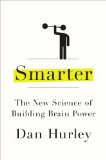December 28, 2013

Smarter: The New Science of Building Brain Power by Dan Hurley (Hudson Street Press, 2013)
(kindle ed.), (amazon.co.uk), (UK kindle ed.)
Book description from the publisher:
Can you make yourself, your kids, and your parents smarter?
Expanding upon one of the most-read New York Times Magazine features of 2012, Smarter penetrates the hot new field of intelligence research to reveal what researchers call a revolution in human intellectual abilities. Shattering decades of dogma, scientists began publishing studies in 2008 showing that “fluid intelligence”—the ability to learn, solve novel problems, and get to the heart of things—can be increased through training.
But is it all just hype? With vivid stories of lives transformed, science journalist Dan Hurley delivers practical findings for people of every age and ability. Along the way, he narrates with acidtongued wit his experiences as a human guinea pig, road-testing commercial brain-training programs, learning to play the Renaissance lute, getting physically fit, even undergoing transcranial directcurrent stimulation.
Smarter speaks to the audience that made bestsellers out of Train Your Mind, Change Your Brain and Moonwalking with Einstein.
Google Books preview:
See also: Author’s website
Comments (0)
- cognitive science,new books,psychology
November 25, 2013

Train Your Mind for Peak Performance: A Science-Based Approach for Achieving Your Goals by Lyle E. Bourne, Jr., and Alice F. Healy (American Psychological Association, 2013)
(amazon.co.uk)
Book description from the publisher:
Whether you’re training to play the piano, speak a foreign language, shoot a target with a bow and arrow, or master the techniques of fine carpentry, the conditions of your training will affect how successfully you learn and perform. How can you process needed new information in order to remember it better and use it in the future? How long should you work, study, or practice before taking a break? How can you counteract fatigue and boredom to improve performance if the task is tedious? This book shares practical tips to help you learn quickly, remember what you learn, and apply it to real-world performance.
Comments (0)
- new books,psychology
November 16, 2013

Mood: The Key to Understanding Ourselves and Others by Patrick M. Burke (Prometheus Books, 2013)
(kindle ed.), (amazon.co.uk)
Book description from the publisher:
A reader-friendly yet in-depth overview of the latest research on mood as the way we are tuned to the world.
This book examines the central role that mood plays in determining our outlook on life and our ability to cope with its challenges. The central theme is that mood determines how we are tuned to the world. Tuning emerges over the course of our earliest development as environmental and genetic influences form the neural circuits and set how they function across the lifespan in daily life and under conditions of stress. How each person is tuned becomes the basis for resilience or vulnerability to events. Some will take events in stride; others may become angry, anxious, or sad.
A child psychiatrist with decades of clinical experience treating patients, the author stresses that relationships play a central role in shaping our mood. Security or insecurity, loss or the fear of loss of key relationships, especially in childhood, can have telling effects on the way we view the world.
A chapter is devoted to each of the disorders where mood is a central issue: depression, anxiety, bipolar disorder, and antisocial disruptive disorders. The author then discusses the various “talking therapies” and the main classes of medication often administered to treat emotional disturbances. Burke concludes by summarizing the latest research on preventing mood disorders and discussing the impact that illness can have on emotional well-being and the role of mood in resilience and recovery.
Google Books preview:
Comments (0)
- new books,psychology





